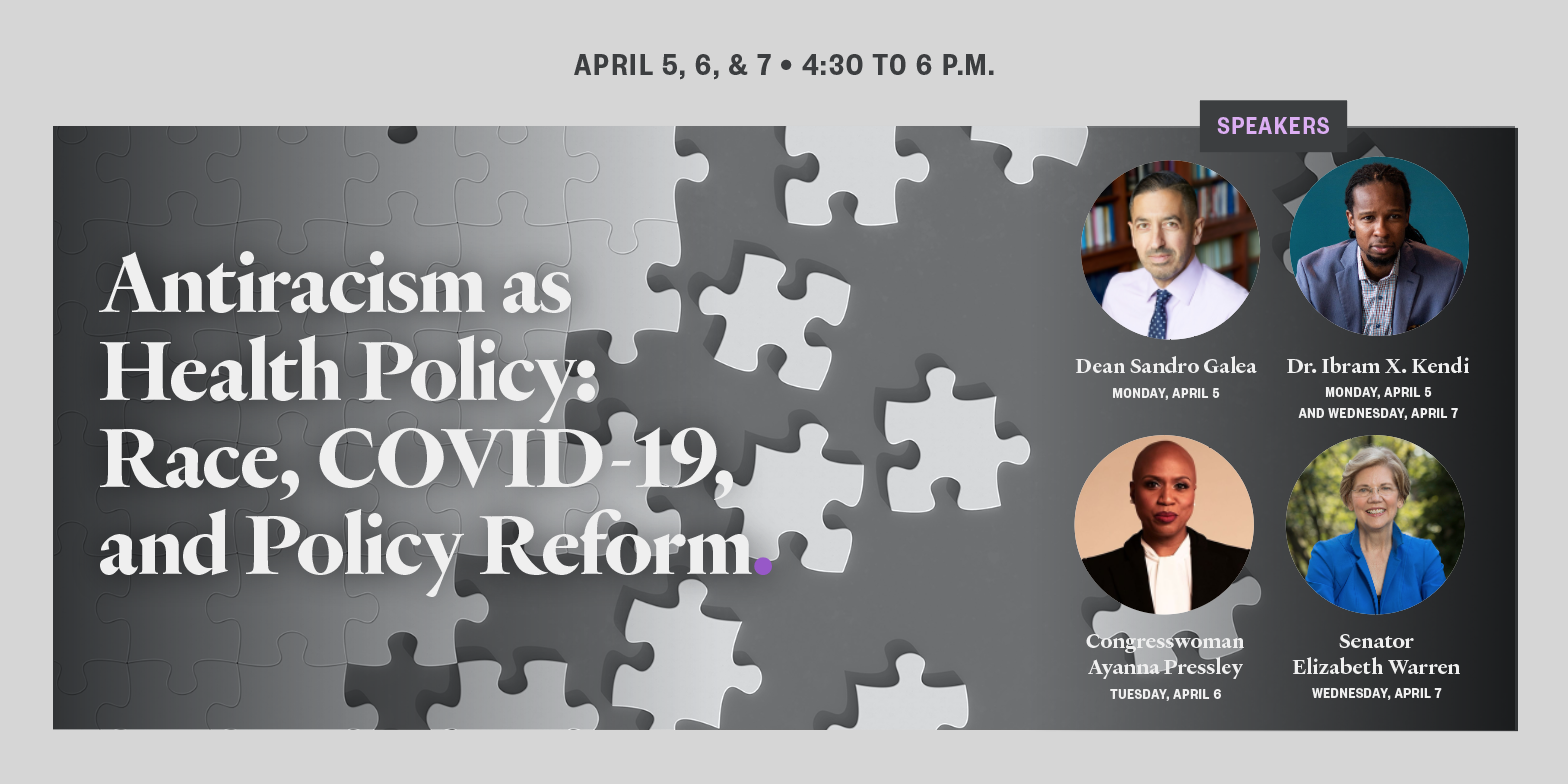Elizabeth Warren, Ayanna Pressley to Speak at SPH Antiracism Event.

Elizabeth Warren, Ayanna Pressley to Speak at SPH Antiracism Event
The three-day program will also convene health experts and race scholars to discuss policy solutions to the racial disparities in health that have been exacerbated by the pandemic.
Senator Elizabeth Warren and US Representative Ayanna Pressley will join Boston University’s School of Public Health and Center for Antiracist Research during a three-day, virtual program that will explore the role of race in shaping health in the United States.
Titled “Antiracism as Health Policy: Race, COVID-19, and Health,” the Public Health Conversation will feature a series of virtual panel presentations and conversations that will also convene Sandro Galea, SPH dean and Robert A. Knox Professor, Ibram X. Kendi, director and founder of the Center for Antiracist Research and Andrew W. Mellon Professor in the Humanities, and other health experts and race scholars in academia and government. The program will take place on Zoom from 4:30 to 6 p.m. Monday, April 5, Tuesday, April 6, and Wednesday, April 7.
The speakers will examine the deep-rooted racial disparities in health that have been exposed and exacerbated by the pandemic, and discuss how to best address racial inequities through research, policy, and action.
Monday’s session will begin with a conversation between Galea and Kendi, followed by a panel discussion that will explore the importance of collecting and utilizing data on race to better understand the short and long-term impacts of the pandemic.
Tuesday’s program, which is also co-hosted by the Rockefeller Foundation-Boston University 3-D Commission, will feature a keynote address by Pressley and a panel discussion that will explore how to incorporate evidence-based research into policymaking. The program will conclude on April 7 with a conversation between Warren and Kendi, followed by a panel discussion that will identify antiracist policy solutions informed by data.
“We have long known that racial disparities exist in health outcomes for Black and Brown communities, but the federal government has yet to tackle the main driver of these disparities,” says Warren. She, Pressley, and California Representative Barbara Lee recently reintroduced legislation that would identify racism as a public health crisis and support the development of anti-racist federal health policies.
“By naming structural racism as the root cause, we can start treating health disparities like we would any other public health crisis: by investing in research into their causes and treating the resulting ‘symptoms’ of centuries of structural racism,” Warren says.
Increasingly over the past year, data have shown that people of color bear the heaviest burden of COVID-19 in terms of risk of exposure, total cases, access to testing and treatment, hospitalizations, deaths, and, most recently, access to vaccinations. But federal COVID data on race and ethnicity was sparse in the early days of the pandemic. The COVID Racial Data Tracker that the Center for Antiracist Research developed with the COVID Tracking Project, filled this gap and highlighted the important role data plays in effective policymaking.
“More comprehensively and more frequently than any other government agency, the COVID Racial Data Tracker tracked, analyzed, and illuminated state and national-level trends in COVID racial inequities through clear and compelling data visualization in real time,” says Monica Wang, associate professor of community health sciences and associate director of narrative at the center. “Data from this tracker importantly highlighted the urgency to prioritize resources, testing, and intervention and vaccination efforts for many different communities of color.”
As one of the coordinators of this week’s event, Wang says she hopes the program’s viewers and participants will gain “an understanding of the devastating extent of the racial disparities, an awareness of how and why they emerged, and a commitment to exploring new paths forward to build an equitable society.”
Comments & Discussion
Boston University moderates comments to facilitate an informed, substantive, civil conversation. Abusive, profane, self-promotional, misleading, incoherent or off-topic comments will be rejected. Moderators are staffed during regular business hours (EST) and can only accept comments written in English. Statistics or facts must include a citation or a link to the citation.